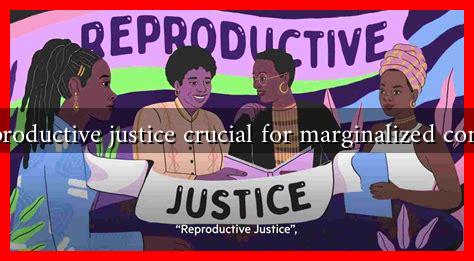-
Table of Contents
Why is Reproductive Justice Crucial for Marginalized Communities?
Reproductive justice is a framework that goes beyond the traditional pro-choice and pro-life debates, emphasizing the right to have children, not have children, and parent in safe and supportive environments. For marginalized communities, particularly women of color, low-income individuals, and LGBTQ+ populations, reproductive justice is not just a matter of personal choice; it is a critical issue that intersects with various social, economic, and political factors. This article explores why reproductive justice is essential for these communities and how it can lead to broader societal change.
The Intersection of Reproductive Justice and Marginalization
Marginalized communities often face systemic barriers that limit their reproductive choices. These barriers can include:
- Economic Inequality: Many individuals in marginalized communities lack access to affordable healthcare, including reproductive health services. According to the Kaiser Family Foundation, low-income women are more likely to experience unintended pregnancies due to limited access to contraception.
- Racial Discrimination: Women of color often face higher rates of maternal mortality and morbidity. The CDC reports that Black women are three to four times more likely to die from pregnancy-related complications than white women.
- Legal Barriers: In many states, restrictive laws limit access to abortion and reproductive health services, disproportionately affecting marginalized communities who may not have the means to travel to areas with more accessible services.
Case Studies: The Impact of Reproductive Justice
Several case studies illustrate the importance of reproductive justice for marginalized communities:
- The Black Mamas Matter Alliance: This organization advocates for Black maternal health and aims to address the disparities faced by Black women in pregnancy and childbirth. Their work highlights the need for comprehensive healthcare that respects the unique experiences of Black mothers.
- Planned Parenthood’s Community Outreach: Planned Parenthood has been instrumental in providing reproductive health services to underserved communities. Their outreach programs focus on education, access to contraception, and safe abortion services, which are vital for empowering marginalized individuals.
- Indigenous Women’s Health: Indigenous women face unique challenges related to reproductive justice, including historical trauma and lack of access to healthcare. Organizations like the National Indigenous Women’s Resource Center work to address these issues by advocating for culturally competent care and policy changes.
The Broader Implications of Reproductive Justice
Reproductive justice is not only about individual rights; it has broader implications for society as a whole. When marginalized communities have access to reproductive health services, several positive outcomes can occur:
- Improved Public Health: Access to reproductive healthcare leads to better health outcomes for mothers and children, reducing maternal and infant mortality rates.
- Economic Empowerment: When individuals can make informed choices about their reproductive health, they are better positioned to pursue education and career opportunities, contributing to economic stability.
- Social Justice: Reproductive justice is inherently linked to social justice. By advocating for the rights of marginalized communities, we challenge systemic inequalities and promote a more equitable society.
Conclusion: The Path Forward
Reproductive justice is crucial for marginalized communities as it addresses the systemic barriers they face in accessing reproductive health services. By advocating for comprehensive healthcare, legal protections, and social support, we can empower individuals to make informed choices about their bodies and families. The fight for reproductive justice is not just a fight for individual rights; it is a fight for social equity and justice for all. As we move forward, it is essential to center the voices of marginalized communities in this discourse, ensuring that their needs and experiences shape the policies and practices that affect their lives.
For more information on reproductive justice and its impact on marginalized communities, consider visiting organizations like the SisterSong Women of Color Reproductive Justice Collective, which provides resources and advocacy for reproductive rights.


